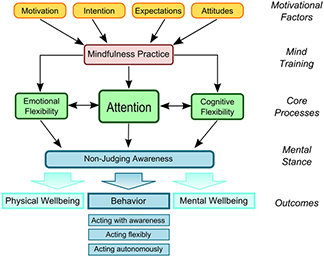Computational Theories of Mindfulness
By Liza Tatishev
Mindfulness involves non-judgmental moment-to-moment self-awareness of physical and mental states– it is the ability to be fully conscious and aware. Within the past decade, scientific interest in mindfulness practices has increased. Mindfulness has a long history: originating over 2,500 years ago in Indian Buddhist tradition [1]. By the mid-twentieth century, mindfulness became secularized and incorporated into psychological intervention methods to improve emotional well-being [2]. Today, mindfulness-based intervention methods are recognized as successful approaches in treating a variety of psychological disorders, including depression, anxiety, and addiction. A more precise understanding of mindfulness can benefit the refinement of mindfulness-based intervention methods.
A more precise understanding of mindfulness can benefit the refinement of mindfulness-based intervention methods. Artificial neural networks within the field of computational neuroscience offer a method to examine the neuroscience of mindfulness.
Psychological Mechanisms
As a psychological intervention method, mindfulness practices– such as Tibetan Buddhist imagery meditation [3], Zen meditation [4], and Kundalini yoga [5]– are grounded in training and refining attention skills. Attentional control is a key cognitive process of executive functioning (also referred to as cognitive control) necessary for emotional and behavioral regulation [6].
Cognitive control
Mindfulness training has been shown to enhance cognitive control in children and adults [7]. On a phenomenological level, the process of mindfulness training engages with the self-regulation of cognitive states that are interrelated with attentional networks.
Within cognitive psychology, attention consists of sub-processes (including alerting, sustained attention, and conflict monitoring) that underlie the ability to attend to stimuli. Higher self-reported mindfulness is related to higher measures of more stable sustained attention [9]. Furthermore, longitudinal studies have found that engaging in mindfulness practices correlated with improvement in sustained attention tasks over the course of intervention [10].
Sustained attention recruits attentional control functions, while inhibiting proponent, but non-relevant responses [11]. Research has demonstrated that mindfulness may improve performance on attentional control tasks, however experimental designs should be improved to remove discrepancies in the field [12].
Evidence for mindfulness practice improving sustained attention and attentional control processes exists. Enhanced cognitive control network activity is associated with increased psychological well-being [13] [14] [15].
Therapies
Mindfulness offers a framework of self-awareness, -regulation, and -transcendence that can be implemented in psychological intervention methods [16]. Mindfulness is now incorporated as a major component of empirically supported psychological intervention methods, including mindfulness-based stress reduction (MSBR) [17], mindfulness-based cognitive therapy (MBCT) [18], acceptance and commitment therapy, and dialectical behavior therapy [19].
